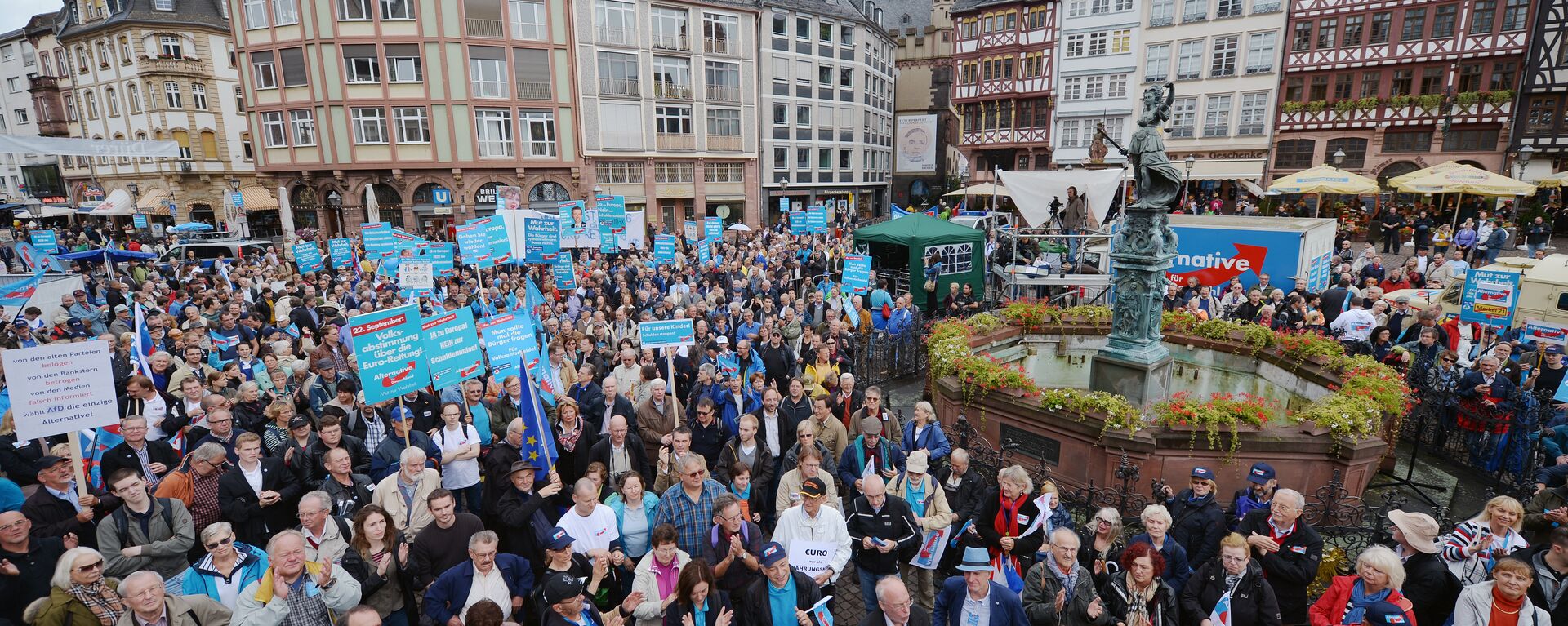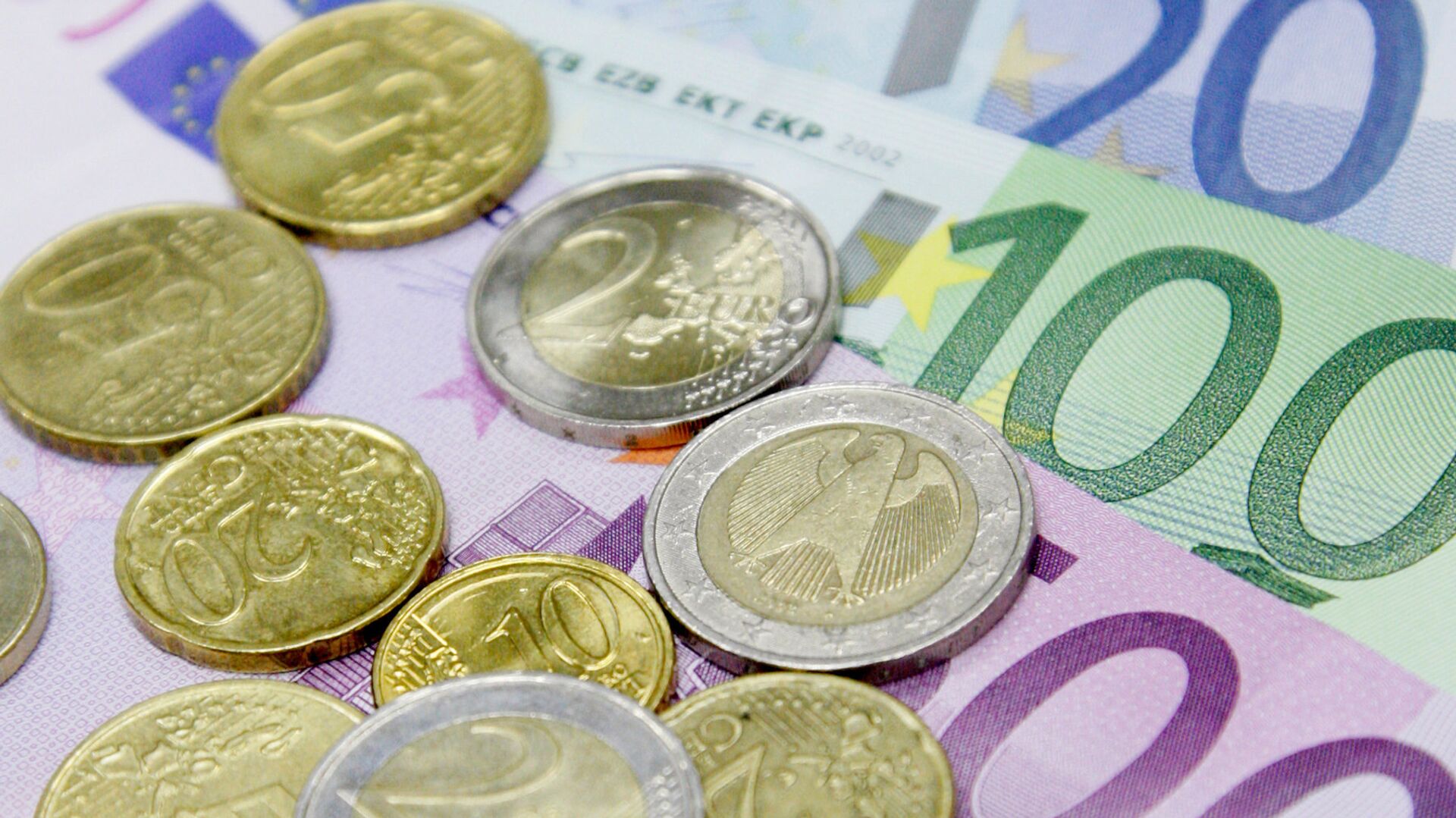https://sputnikglobe.com/20231204/why-eu-funding-to-ukraine-may-soon-fade--1115374023.html
Why EU Funding to Ukraine May Soon Fade
Why EU Funding to Ukraine May Soon Fade
Sputnik International
European conservatives are skeptical of further spending on Ukraine and have vowed to reshape the Old Continent's politics after the forthcoming EU parliamentary elections where they are projected to take more seats. What could this mean for Kiev?
2023-12-04T14:34+0000
2023-12-04T14:34+0000
2023-12-05T09:24+0000
europe
analysis
gillbert doctorow
geert wilders
viktor orban
ukraine
kiev
brussels
european union (eu)
alternative fuer deutschland (afd)
https://cdn1.img.sputnikglobe.com/img/102495/97/1024959725_0:371:1805:1386_1920x0_80_0_0_eec2a784ed15626e01bcd544eaafec81.jpg
A recent €50 billion EU allocation for Ukraine is reportedly at risk as member states fail to reach an agreement on a common budget, according to the Financial Times. The newspaper particularly cites the victory of the right wing in the Dutch elections last month and a recent German court ruling limiting government borrowing.International observers have recently drawn attention to the rise of the right wing across Europe, suggesting that the Ukraine conflict and the Gaza war could have become a catalyst for the trend. In Germany, the Alternative for Germany (AfD) party is currently polling 21%, second only to CDU/CSU (30%). The AfD is highly skeptical about the bloc's funding and militarizing the Kiev regime. Similarly, Hungarian Prime Minister Viktor Orban shares a similar stance. Moreover, he has recently signaled that he is against discussing Ukraine’s accession to the EU during the union's December summit. In November, he threatened to use Hungary’s veto power to block the provision of a planned €50 billion for Kiev.Meanwhile, European conservatives are closing ranks ahead of the EU parliamentary elections, scheduled to be held on June 6-9, 2024. During the gathering, EU conservatives criticized Western sanctions against Russia and the futility of funding Ukraine that "cannot win." Per them, Brussels' Ukraine agenda comes in contrast to national interests of EU member states. That said, some divisions on approaches to Russia persist among the European right wing movement, AfD lawmaker and ID Vice-President Gunnar Beck told Politico, a conclusion which Doctorow agrees with.Similarly, right-wing parties don't have a unified position on Ukraine, echoes Kartheiser:"Regrettably, right-wing parties have no unified position on Ukraine. Most of them follow traditional, national lines of reasoning. This is even more surprising since many of the Republican presidential candidates and even some Democrats in the US take their distances from the Biden-policy on Ukraine. At this stage, only right-wing parties in some of the major European States can contribute to a change of policy, namely in France and Germany and, of course, in the Netherlands. However, in a few months from now, this can evolve because the war is less and less popular and the approach of the European elections might make them reconsider their positions," the Luxembourg Parliament MP concluded.
https://sputnikglobe.com/20231126/rise-of-right-how-ukraine-conflict-and-gaza-war-affect-eus-political-balance-1115214954.html
ukraine
kiev
brussels
gaza strip
Sputnik International
feedback@sputniknews.com
+74956456601
MIA „Rossiya Segodnya“
2023
News
en_EN
Sputnik International
feedback@sputniknews.com
+74956456601
MIA „Rossiya Segodnya“
Sputnik International
feedback@sputniknews.com
+74956456601
MIA „Rossiya Segodnya“
eu, europe, european parliament elections, eu right-wing parties, rise of eu right-wing parties, eu aid to ukraine, eu conservatives aid to ukraine, viktor orban, geert wilders, volodymyr zelensky
eu, europe, european parliament elections, eu right-wing parties, rise of eu right-wing parties, eu aid to ukraine, eu conservatives aid to ukraine, viktor orban, geert wilders, volodymyr zelensky
Why EU Funding to Ukraine May Soon Fade
14:34 GMT 04.12.2023 (Updated: 09:24 GMT 05.12.2023) European conservatives are skeptical of further spending on Ukraine and have vowed to reshape the Old Continent's politics after the forthcoming EU parliamentary elections where they are projected to take more seats. What could this mean for Kiev?
A recent
€50 billion EU allocation for Ukraine is reportedly at risk as member states fail to reach an agreement on a common budget, according to the Financial Times.
The newspaper particularly cites the victory of the right wing in the Dutch elections last month and a recent German court ruling limiting government borrowing.
"I think they [the Financial Times] exaggerate the importance of the election results in the Netherlands," Gilbert Doctorow, an international relations analyst, told Sputnik. "After all, Wilders only captured 23% of the vote, so it is not as if the whole Dutch population agrees to dump Ukraine. Moreover, there are other issues in the EU that are pulling things in the same direction of slowly letting go of [Ukrainian President Volodymyr] Zelensky and his regime. The hole in the German state budget is a bigger factor working against Ukraine at the EU level right now."

26 November 2023, 12:24 GMT
International observers have recently drawn attention to the rise of the right wing across Europe, suggesting that the Ukraine conflict and the Gaza war could have become a catalyst for the trend.
In Germany, the Alternative for Germany (AfD) party is currently polling 21%, second only to CDU/CSU (30%). The AfD is highly skeptical about the bloc's funding and militarizing the Kiev regime.
Similarly, Hungarian Prime Minister Viktor Orban shares a similar stance. Moreover, he has recently signaled that he is against discussing Ukraine’s accession to the EU during the union's December summit. In November, he threatened to use Hungary’s veto power to block the provision of a planned €50 billion for Kiev.
"The right-wing parties are one factor that is important only because it means that the neoliberal gang that runs Brussels does not have absolute control, that there is some small area of free speech and free thought in the McCarthyite societies of the EU," said Doctorow. "The biggest factor is how Europeans are watching what the biggest donor to Ukraine, the US, is going to do given the gridlock on Capitol Hill and failure to include aid to Ukraine in the next fiscal year budget."
Meanwhile, European conservatives are closing ranks ahead of the EU parliamentary elections, scheduled to be held on June 6-9, 2024.
Europe's right-wing leaders gathered in the Italian city of Florence on Sunday with a bid to make the Identity and Democracy (ID) group, the third-largest after the center-right European People’s Party (EPP) and the center-left Socialists & Democrats in the EU Parliament.
During the gathering, EU conservatives criticized Western sanctions against Russia and the futility of funding Ukraine that "cannot win." Per them,
Brussels' Ukraine agenda comes in contrast to national interests of EU member states.
"The sanctions have a boomerang effect on the European economies, they increase the inflation rate and weaken our competitiveness," Fernand Kartheiser, Luxembourg Parliament MP from the Alternative Democratic Reform Party who is also a member of the European Conservatives and Reformists board, told Sputnik. "In addition, the war in Ukraine has reduced the West’s role in the world through the impressive growth of the BRICS-movement. If you add to that list of mistakes the fact that all those efforts have basically been for nothing, since Ukraine is losing the war, then of course it is clear that questions will come up about the strategic choices that have been made and who is going to take the responsibility for them?"
That said, some divisions on approaches to Russia persist among the European right wing movement, AfD lawmaker and ID Vice-President Gunnar Beck told Politico, a conclusion which Doctorow agrees with.
"There was no consensus among right-wing parties across Europe if you consider that the PiS [Law and Justice] party of the Kaczyńskis that has run Poland until the latest national elections is right-wing as can be and is violently anti-Russian whereas most other right-wing parties in Europe are pro-Putin. (…) The only commonality is strong defense of national sovereignty and tough criticism of the EU institutions in Brussels," Doctorow said.
Similarly, right-wing parties don't have a unified position on Ukraine, echoes Kartheiser:
"Regrettably, right-wing parties have no unified position on Ukraine. Most of them follow traditional, national lines of reasoning. This is even more surprising since many of the Republican presidential candidates and even some Democrats in the US take their distances from the Biden-policy on Ukraine. At this stage, only right-wing parties in some of the major European States can contribute to a change of policy, namely in France and Germany and, of course, in the Netherlands. However, in a few months from now, this can evolve because the war is less and less popular and the approach of the European elections might make them reconsider their positions," the Luxembourg Parliament MP concluded.



